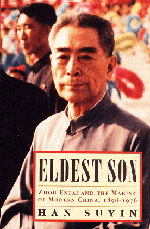GOLDSEA | ASIAN BOOKVIEW | NONFICTION
Eldest Sonby Han Suyin
Hill and Wang, New York, 1994, 483pp, $27.50
Zhou Enlai and the Making of Modern China, 1898-1976
EXCERPT
 hou Enlai was undoubtedly deeply in love with Deng Yingchao, yet when he returned from France and reached Hong Kong that September, he did not go to see her in Beijing. He was a responsible Party man, he had to set an example of selflessness and discipline, and so he went directly to Canton--now known as Guangzhou--arriving there on September 10. But he continued to write to Yingchao, and it seems he asked her several times to marry him. Yingchao was then a teacher and bookkeeper at the Tajen school for girls in Beijing, a school established and run by Thousand-Mile Horse, Ma Qianli. Zhou sent a good many letters to her in care of him as school director, but Ma was afflicted with absentmindedness and shoved the letters into a drawer until a friend of Enlai came to inquire. Enlai was worried when he received no reply. "I think they're here," Ma said, opening the drawer. Out from it spilled a dozen unopened letters.
hou Enlai was undoubtedly deeply in love with Deng Yingchao, yet when he returned from France and reached Hong Kong that September, he did not go to see her in Beijing. He was a responsible Party man, he had to set an example of selflessness and discipline, and so he went directly to Canton--now known as Guangzhou--arriving there on September 10. But he continued to write to Yingchao, and it seems he asked her several times to marry him. Yingchao was then a teacher and bookkeeper at the Tajen school for girls in Beijing, a school established and run by Thousand-Mile Horse, Ma Qianli. Zhou sent a good many letters to her in care of him as school director, but Ma was afflicted with absentmindedness and shoved the letters into a drawer until a friend of Enlai came to inquire. Enlai was worried when he received no reply. "I think they're here," Ma said, opening the drawer. Out from it spilled a dozen unopened letters.
The headquarters of the regional committee in Guangzhou were on the second floor of a building on Wen De Road. It was the only Communist office which operated openly in China. Zhou was appointed secretary of the United Front Regional Committee for the two provinces of Guangdong and Guangxi. Guangdong was the province over which Sun Yatsen exercised precarious control, and in adjacent Guangxi, the warlords, for the time being, supported Sun's "government".
Guangzhou was a vital and boisterous city, with a fertile hinterland and abundant water from the Pearl River. It was a major port, its existence dating back to two centuries before Christ, when, legend said, a genie leading five rams settled here. Hence it was also called the City of Rams. Its people are energetic, quarrelsome, and even today cling fiercely to their own dialect, Cantonese. One wonders how Zhou manages, since he did not speak Cantonese. Yet he is reported to have made a major speech in October to a crowd of 5,000.

In that year the people of Guangzhou were filled with hope. They had a long history of opposition to the fankui, the foreign devils. Whole villages had gone to war against the British during the nineteenth century armed with nothing but spears. For the last two centuries the province had supplied immigrants to many countries, since the colonial powers required labor for their plantations in Southeast Asia. Immigration had accelerated in the nineteenth century, and thousands had flocked abroad, bought at eight dollars a head, to build the railways of the New World and to dig the Panama Canal. Half of the Overseas Chinese communities came from this one province.
Sun Yatsen was partly an Overseas--though born in China--having been educated in Hawaii and having stayed many years abroad. He had strong connections with communities outside China. His Foreign Minister, Eugene Chen, was an Overseas, born in Trinidad. His Finance Minister, Liao Zhungkai, came from a distinguished Overseas family, as did his wife, Soong Chingling.
ASIAN AIR ISSUES FORUM |
CONTACT US
© 1999-2003 GoldSea
No part of the contents of this site may be reproduced without prior written permission.
